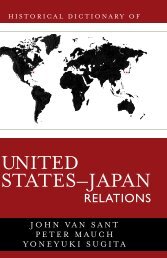Confucian Political Theory in the Face of the Future1 Mon-Han Tsai
Confucian Political Theory in the Face of the Future1 Mon-Han Tsai
Confucian Political Theory in the Face of the Future1 Mon-Han Tsai
You also want an ePaper? Increase the reach of your titles
YUMPU automatically turns print PDFs into web optimized ePapers that Google loves.
<strong>in</strong> Bakamatsu Japan (1850-1868), <strong>in</strong> his Kokuze Sanron (Three Treatises on <strong>the</strong> State <strong>of</strong><br />
Affairs), compared George Wash<strong>in</strong>gton to Yao and Shun, <strong>the</strong> ancient sage-k<strong>in</strong>gs <strong>in</strong><br />
Ch<strong>in</strong>a most revered by <strong>Confucian</strong>s and he fur<strong>the</strong>r regarded <strong>the</strong> United States <strong>of</strong><br />
America was as good as Three dynasties, <strong>the</strong> golden age <strong>of</strong> <strong>the</strong> virtuous government.<br />
This analogy and equation <strong>of</strong> Western political figures and ideas with <strong>Confucian</strong><br />
political ideals eased <strong>the</strong> way to appreciate Western political <strong>the</strong>ory <strong>in</strong> due course. It<br />
rem<strong>in</strong>ded Neo-<strong>Confucian</strong>-tra<strong>in</strong>ed <strong>in</strong>tellectuals <strong>in</strong> East Asia <strong>the</strong>n that “pr<strong>in</strong>ciple (li, or<br />
理 ) is <strong>of</strong> one but its manifestation is multifaceted ( 理 一 分 殊 )”. That is if Western political<br />
ideas are better, <strong>the</strong>y are better not because <strong>of</strong> its foreign ancestry or its military<br />
superiority, but due to its faithful adherence to pr<strong>in</strong>ciple (li).<br />
S<strong>in</strong>ce <strong>the</strong> realisation <strong>of</strong> Western superiority, both Ch<strong>in</strong>ese and Japanese rushed to<br />
translate Western books and terms en masse. Translation has a few dist<strong>in</strong>ct<br />
characteristics: conflation, dist<strong>in</strong>ction and neologism. Conflation refers to one term <strong>in</strong><br />
one l<strong>in</strong>guistic context is conflated or equated with ano<strong>the</strong>r term <strong>in</strong> a different l<strong>in</strong>guistic<br />
context. It is less problematic if <strong>the</strong> terms <strong>in</strong> question have physical references or<br />
properties. It immediately becomes less straightforward when terms have no external<br />
physical references. For example, love is now translated as Ai ( 愛 ) <strong>in</strong> both Ch<strong>in</strong>ese and<br />
Japanese, but <strong>the</strong> term, Ai <strong>in</strong> East Asia has no comparable history to <strong>the</strong> word, love, <strong>in</strong><br />
<strong>the</strong> West. In fact, <strong>the</strong> word, love, <strong>in</strong> <strong>the</strong> West has no comparable word <strong>in</strong> East Asia at all<br />
until <strong>the</strong> word, Ai, began to take on <strong>the</strong> connotations and nuisances <strong>of</strong> <strong>the</strong> word, love, as<br />
it were <strong>in</strong> <strong>the</strong> West. This conflation is <strong>of</strong> little difficulty and <strong>in</strong> some sense, it can be<br />
argued, depend<strong>in</strong>g on your viewpo<strong>in</strong>t, it transforms <strong>the</strong> vocabulary and experiences <strong>of</strong><br />
people <strong>in</strong> East Asia for better or for worse.<br />
None<strong>the</strong>less, <strong>in</strong> <strong>the</strong> case <strong>of</strong> feudalism, it has devastat<strong>in</strong>g effects on <strong>the</strong> endogenous<br />
and orig<strong>in</strong>al word, Fengjian (Ch<strong>in</strong>ese) or Hokken (Japanese) ( 封 建 ). Fegnjian <strong>in</strong> East<br />
Asia has a history <strong>of</strong> at least 2500 years old as <strong>the</strong> word first appeared <strong>in</strong> Zuo-Zhuan<br />
(Commentary <strong>of</strong> Zuo on Annals <strong>of</strong> Spr<strong>in</strong>g and Autumn). It later developed <strong>in</strong>to a major,<br />
if not <strong>the</strong> most important, <strong>Confucian</strong> political <strong>the</strong>ory (Zhang and Sonoda, 2006) 5 . It is<br />
<strong>the</strong>refore not exaggerat<strong>in</strong>g to say that if one fails to know fengjian political <strong>the</strong>ory, one<br />
actually cannot be said to have adequate grasp <strong>of</strong> <strong>Confucian</strong> political <strong>the</strong>ory (especially<br />
5 The book edited by Zhang and Sonoda (2006) is by far <strong>the</strong> best book ever written on fengjian as<br />
<strong>Confucian</strong> political <strong>the</strong>ory, as it rightly positions fengjian political <strong>the</strong>ory as <strong>the</strong> loci <strong>of</strong> political,<br />
economic and social debates until <strong>the</strong> early 20 th century. My recent lectures on Fengjian and Junxian<br />
at United International College <strong>in</strong> Zhuhai, Ch<strong>in</strong>a, forthcom<strong>in</strong>g <strong>in</strong> an edited volume fur<strong>the</strong>r elucidates<br />
<strong>the</strong> centrality and <strong>in</strong>dispensability <strong>of</strong> <strong>the</strong> fengjian political <strong>the</strong>ory <strong>in</strong> history <strong>of</strong> East Asian political<br />
thought.<br />
5













